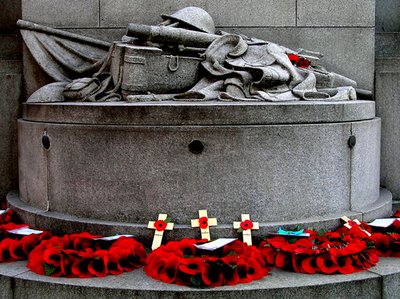
To be honest i hadn't intended to write about Remembrance Day.
What do you say, what can anyone say? It all seemed a little too difficult, too hard - but then again that's what makes wirting so precious and meaningful, it was never meant to be easy, taking on sensitive subjects that are emotionally charged.
I have read many blogs, and one of the comments made on
Awareness' site has stirred me to put fingers to keyboard. I guess in the end we do not choose art, art in fact chooses us, in the end I have to write...I have no choice. I have reflected much those well known lines from Laurence Binyon's poem 'For the Fallen', and this is what that pondering has evoked:
To be honest I have no interest in the easy options regarding the rights and wrongs of war and remembrance. To me it is clear enough that the foundation of western civiization is tied to Christian conceptions of morality, and western politics have been dramatically shaped by Christian thinking. It is equally clear that Christianity is an historical religion - it is founded upon coming to know God, not as an abstract deity in a remote heaven, but rather as a first century Palestinian artisan. but whilst this may be fascinating, it doesn't help our questions, so back to the beginning.
Central to my thinking is a question common to contemporary historiography: 'What is history?', but my question digs further, 'what is history for?'.
All our talk about abstract entities, like history, must be grounded in some type of human experience. just as talk of love is grounded in our experience of travel, so that our relationships can come to a cross-road or a dead end, they can soar or force us to bail out, they can be on track or come off the rails, they can go full steam ahead or founder. So our talk of history is grounded in our experience of personal identity, of being somebody. The language of history then, is the language of national character, of internal pressures and external affairs, of moral battles and political decisions. The end result is that our understanding of history is as important in forming our individual characters as individual characters are in shaping history.
On Remembrance Day in Britain, the National Day of Mourning in Germany, Armistice Day across the Commonwealth, in the United states, ceremonies, where people gather to remember events mostly outside there own experience.
It is now over 90 years since Binyon's poem was penned - almost 9 million soldiers fell - the entire population of Guernsey 150 times over!
These are the facts the bare figures - they are not history, rather its foundation.. History itself is the search for meaning among the facts, for explanation and understanding, for causes, for motivations, tricky situations, clumsy manipulations, brilliant solutions and skillful orchestrations - the effort to discern the difference between fickle fortune and sensible strategy, feckless folly and wise policy. It is an attempt to gain insight into who we are by looking closely at how we ended up where we are now. History puts the present into perspective. What we opt to recall shapes the decisions we take in future.
Only those who forgot the cry "never again' could have supported the invasion of Iraq, for example. As Ayn Rand so pithily put the point, "Every major horror of history was committed in the name of an altruistic motive." Only those who forgot the true cost of war - to the victors as to the vanquished - could choose war before the exhaustion of other options.
I am beginning to believe more and more that there is a greater cost of war than that which is measured in cash, in body counts and privations at home. It is the dehumanizing damage done to the human soul
Our history is a tale of the influence of ignorance and greed, folly and violence pursued by the politically powerful, but played out in the lives of ordinary people - the one's who get hurt. If we do not learn from it, we are condemned to repeat it (something i found sobering as I explained why the sirens were sounding at 11am on the 11th of November). What value is democracy to an indifferent or ignorant public?
Salvation, the goal of all true religion, demands that we remember - WE remember - both the evils that can infest even a noble political system and the good that can spring forth from even the most hardened heart. Salvation demands that we remember - and repent of the evil; for if we united by our common history and our common humanity can hold the powerful to account and demand the good of all over the greed of the minority, only we can promote the pursuit of peace, can insist on common decency and fair policy.
So, in church yesterday, as I bowed in sorrow and reverence before the dead, I swore to myself once again to pit historical truth against fanatical propaganda: a genuine grief against moral indifference. 'Never again' That is what i said to myself - The violent must be held to account - and I pray to God for the strength to arm the next generation with the moral courage and vision to make it so.




